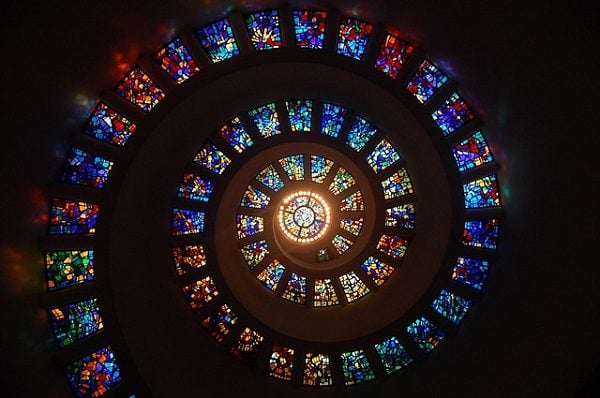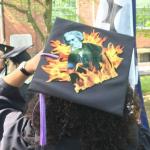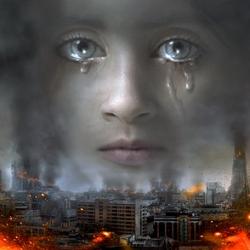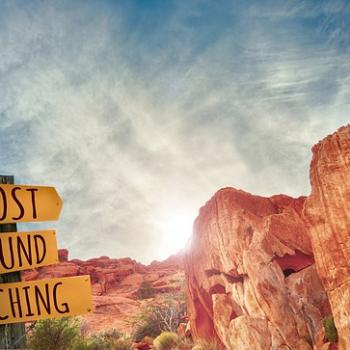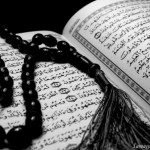This is Day 18 of the #30Days30Writers Ramadan series.
Mothers are nature’s garbage disposals when it comes to their children. Something happens after you give birth that largely removes your aversion to bits of suspicious cheese stuck on a high chair, morsels of gummy rice clinging to the side of a chubby, soft baby cheek, the slurry of backwash at the bottom of a shared glass of water.
And that’s why, as I fed my toddler his lunch a couple of weeks ago, trying to negotiate his attention, the sippy cup he casually dropped onto the floor for the hundredth time, and a cat that wanted nothing more than to lick the scrambled eggs now congealing next to me, I raised the dried-out bit of buttered toast I had retrieved mid-air when the baby spat it out as soon as I had stuffed it through his lips. Absently my hand went to my own hungry mouth, ready to pop it in as always, so I could free up my hand and try feeding him a fresh bite.
Then I froze.
My tongue was dry, and my head hurt. My stomach growled at the crumbly brown nugget I held under my nose. I was ready to hoover it up, hoover up all my baby’s leftovers instinctually. But, I couldn’t.
It was the second day of Ramadan, and I was fasting.
I lowered that otherwise undesirable nugget and stared at it longingly, and a terrible thought crossed my mind.
“No one will know if you eat it but God.”
This is the kind of thought that is likely to occur to a kid or teenager in their early years of fasting. Understandable. At 43, after having fasted for Ramadan for more than three-quarters of my life, it’s kind of mortifying.
Still, I should have expected that I would encounter my own self in such a dilemma this Ramadan. Because this Ramadan came as I still struggled with unexpected motherhood at an age where I thought was done having and raising kids. The chronic sleep deprivation that comes from over year of constantly interrupted slumber is mind-numbing, delirium inducing. My sweet, rotund little guy was a joy all day, but his nights were bad. And, his bad nights meant bad days for me.
Physical and emotional fatigue has worn my body and mind down since I had him; after all, I was back at work when he was two weeks old. Despite all signs to the contrary, I was still hoping beyond hope that in Ramadan my soul would bounce back, replenished and bursting, enough to keep the rest of me energized.
In that moment though, as I contemplated the contraband in my hand, I knew it would not be that kind of Ramadan.
As soon as my worst-self whispered fasting rebellion into my clouded mind, I had another thought: A recollection from a conversation I had nearly 15 years ago.
I had just begun wearing hijab. It wasn’t yet a permanent fixture; I was still in the “can I do this, should I do this” phase, wearing it on and off, trying to figure out if I would be capable of all that it meant. I met a friend for lunch, a Muslim, who wasn’t very impressed with this new incarnation. She thought maybe I was going through a phase. At that point, I probably wondered the same thing too.
As we ate and talked entirely too long about the two feet of gauzy fabric pinned around my face, she said (trying to talk me out of my ill-conceived religious experiment), “Life is too short.”
I looked up at her and responded, “Yes. Exactly. Life is too short.”
She had inadvertently convinced me, with those four short words, that wearing hijab was the right thing to do for me because ultimately, this life would quickly pass and there was much more ahead to prepare for. If I can point to the moment that my inconsistent dabbling in this religious observation became a permanent conviction, it was that moment.
Likewise, toast in hand, as soon as I thought, “No one will know if you eat it but God.” my heart responded, “That’s right, no one will know but God.”
That’s both the sweetness and test of Ramadan — that no one can really know if you are indeed fasting from food and drink but Allah swt. Not your spouse, your children, not your closest friend. Just God.
The realization of the intimacy between ourselves and God hit me, as it has hit me in the past and then faded as most things do. And of course, this intimacy, the knowledge of who you really are and what you really do belonging only with God, is not just about fasting.
It’s about nearly everything we do in life, why we do it, who we do it for. Social media is proof positive that no matter how many times you tweet, post, like, comment or upload, you remain an unknown quantity to even those who devoutly “follow” you. The digital space is evidence that no matter how frequently or broadly you share your outward life, or your inner self, only Allah swt truly knows you.
Religion often makes the mistake of turning blessings into tests or even punishments. “Allah swt is watching you” becomes a way to frighten kids, an invisible stick to keep their behavior in check, not unlike threats of a boogey man hiding in the closet and keeping an eye out for good and bad kids.
It’s not just unfortunate though; it’s deeply damaging to our sense of intimacy with God, to think of Him like an unseen judge, jailer and executioner.
I believe it was never meant to be that way.
The understanding that “no one will know but God” is a door, an invitation to a relationship with Him, the possibility of a profound connection that can never be replicated, understood by others, or exposed.
When my heart whispered back, “that’s right, no one will know but God,” it was an offer to something sweeter than buttered bread between my teeth. And, it was also a consolation, that our hunger, thirst, pain, struggle, hurt — the things no one can see — is always being witnessed by the One who was here at the beginning and will be there at the end.
I may not be able to spend hours in dhikr or attend tarawih prayers or recite the entire Quran this Ramadan. But if for the coming year I can hold on to the realization I had in the moment when my babbling baby sat before me, his leftovers on offer — my soul will power my body through whatever comes my way.

